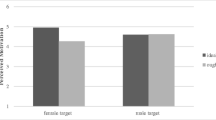Abstract
Sex differences in three components of decision control were examined in a series of studies utilizing 4-, 9-, and 14-year-old subjects. These components were actual decision control behavior, the cognitive understanding of the masculine or feminine nature of decision control, and the self-perception of decision control skills. At the behavioral level, boys controlled more decision outcomes than girls, especially at the oldest age grouping. In the area of self-perception, girls were less likely to perceive themselves as decision controllers compared to their male counterparts in the oldest age grouping. As far as general attitudes were concerned, neither boys nor girls equated decision control with masculinity. Results are discussed in terms of the socialization of powerlessness in women.
Similar content being viewed by others
References
Adams, K., & Landers, D. Sex differences in dominance behavior. Sex Roles 1978, 4 215–223.
Anderson, H. Domination and integration in the social behavior of young children in an experimental play situation. Genetic Psychology Monographys 1937, 19 341–408.
Anderson, H. Domination and integration in the behavior of kindergarten children in an experimental play situation. Journal of Experimental Psychology 1939, 8 123–131.
Baltes, P., Rees, H., & Nesselroade, J. Life-span developmental psychology: Introduction to research methods. Monterey, Calif.: Brooks-Cole, 1977.
Bofinger, E. Personal Communication. Department of Mathematics, University of New England, 1980.
Edelbrook, C., & Sugawara, A. Acquisition of sex-typed preferences in preschool-aged children. Developmental Psychology 1978, 14 614–623.
Falkenberg, S., Rubin, T., & Waern, Y. Sex role concepts in eight and twelve years olds. Scandinavian Journal of Psychology 1977, 18 31–37.
Garrett, S., Ein, P., & Tremaine, L. The development of gender stereotyping of adult occupations in elementary school children. Child Development 1977, 48 507–512.
Gough, P. A study of attitude changes in fifth graders generated by a direct teaching strategy to provide awareness of sex role stereotyping, Dissertation Abstracts International 1978, 38 5234A-5235A.
Hays, W. Statistics for psychologists. New York: Holt, 1963.
Lerner, R., Benson, P., & Vincent, S. Development of societal and personal vocational role perception in males and females. Journal of Genetic Psychology 1976, 129 167–168.
Omark, D., & Edelman, M. Peer group social interactions from an evolutionary perspective. Paper presented at the Society for Research in Child Development Conference, Philadelphia, 1973.
Rumenik, D., Capasso, D., & Hendrick, J. Experimenter sex effects in behavioral research. Psychological Bulletin 1977, 84 852–877.
Summers, A. Damned whores and God's police: The colonisation of women in Australia. Melbourne: Allen Lane, 1975.
Ullian, D. The development of conceptions of masculinity and femininity. In B. Lloyd & J. Archer (Eds.), Exploring sex differences. New York: Academic Press, 1976. Pp. 25–48.
Unger, R. Male is greater than female: The socialization of status inequality. Counseling Psychologist 1976, 6 2–9.
Wahrman, R., & Pugh, M. Sex, nonconformity and influence. Sociometry 1974, 37 137–147.
Zalk, S., & Katz, P. Gender attitudes in children, Sex Roles 1978, 4 349–357.
Zander, A., & Van Egmond, E. Relationship of intelligence and social power to the interpersonal behavior of children. Journal of Educational Psychology 1958, 49 257–268.
Author information
Authors and Affiliations
Rights and permissions
About this article
Cite this article
Lind, P., Connole, H. Sex differences in behavioral and cognitive aspects of decision control. Sex Roles 12, 813–823 (1985). https://doi.org/10.1007/BF00287874
Issue Date:
DOI: https://doi.org/10.1007/BF00287874




